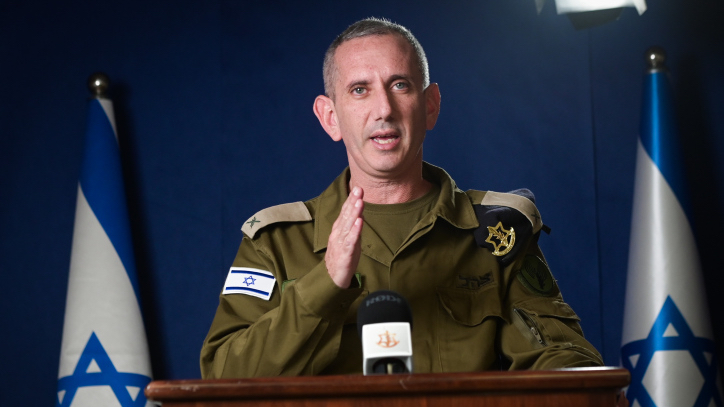Originally published in The Algemeiner.
Every additional day of war with Hamas brings untold costs for Israel: soldiers killed or injured, economic productivity lost, and immense diplomatic and public relations damage (“PR cost”) — i.e., a tarnished global image that quickly metastasizes into virulent antisemitism around the world.
The “PR cost” of the war is in many ways the most consequential, because it can force Israel into yet another inconclusive “ceasefire” that allows Hamas to recover and prepare for the next massacre. And Hamas’ political leadership has already vowed to commit more October 7th-type massacres until Israel is destroyed. Therefore, this war must end differently than all prior ones.
Minimizing the PR cost when waging war against a cynical foe that readily sacrifices innocents to achieve its media objectives is arguably Israel’s greatest military challenge. But an effective PR strategy is critical because it can shorten the duration of the war and minimize the PR cost paid by Israel until the last day of the current conflict, which could last many months.
Hamas knows that it still exists, despite Israel’s military superiority, only because of the PR cost that Hamas inflicted on Israel in each of the prior wars that it provoked. Every time that Hamas launched thousands of rocket attacks at Israeli civilians, forcing Israel to respond with a major military operation (in 2008-9, 2012, 2014, and 2021), the resulting civilian suffering in Gaza led the international community to pressure Israel into accepting a ceasefire that prevented the elimination of Hamas.
Thus, as in all prior conflicts, Hamas conducts its military operations in ways that explode the PR cost to Israel by maximizing the number of Gazan civilians who are exposed to harm as Israel strikes at the Islamist terror organization that massacred 1,400 Israelis and kidnapped hundreds on October 7th. Hamas knows that, for every day that the war with Israel continues, the media will publish images of Gazan civilians suffering from Israeli attacks, and report the usual lopsided casualty figures with little or no context (thus implying that Israel’s attacks are disproportionate).
Because memories are short, Israel must constantly look for ways to remind the world that Hamas is actually responsible for Gazan misery — not just with its unprovoked October 7th massacre that started the current conflict, but with the actions that Hamas has taken before and after, from basing its operational command below hospitals to stealing humanitarian aid.
But emphasizing Hamas’ inhumane war tactics, which prioritize harming Israel over protecting Gazan civilians, is ultimately just a reactive form of PR damage control. Israel should also go on the PR offensive. By using well publicized humanitarian offers that Hamas would accept if it had a modicum of decency and morality, Israel can regularly and publicly expose Hamas for the evil death cult that it is. Israel’s recent insistence that hostages be released in exchange for a “pause” that allows more humanitarian aid is a step in the right direction, because it shows that Hamas prefers to keep Israeli captives rather than to relieve Gazan suffering.
To gain the diplomatic and PR initiative, Israel should offer Hamas an immediate end to Israel’s military operations, if Hamas releases all hostages and voluntarily disarms, which would include cooperating in the destruction of all Hamas tunnels, weapons and other aspects of its military operation. The rationale for such a total surrender is clear: Gaza (and Hamas) will emerge no better from this round of violence than they did from the prior ones, given Israel’s overwhelming military superiority and high morale. And in the absence of an unconditional surrender by Hamas, Israel’s military operation could continue for many months before the genocidal threat to its civilians is removed. The United States went to war for decades to eliminate threats from Islamist terror groups. So the only question is: how much devastation in Gaza is Hamas willing to tolerate before it stops fighting?
To signal the seriousness of Israel’s offer, it could be formally presented at the United Nations and to the foreign ministries of all countries with which Israel has diplomatic relations. Such an offer – with the potential to prevent so much death and destruction in Gaza – would likely generate plenty of free coverage, but Israel could also publish the full text of its offer in the world’s leading newspapers and online media.
As further incentives to accept an “unconditional surrender deal,” Israel could offer Hamas the following:
- Renewed permits for Gazan civilians to work in Israel.
- Restoring all vital services (electricity, communication, fuel, the transfer of medical supplies, etc.)
- Facilitating the tremendous effort to rebuild Gaza after the destruction caused by the war.
- Promoting the development of new infrastructure projects that would benefit Gazan civilians, including power plants, wastewater treatment, etc. (an incentive for peace that Israel has tried offering in the past with no success).
In the extremely unlikely event that Hamas unconditionally surrenders, Israel’s deterrence will have been restored by a forceful military response culminating in images of total victory: Hamas handing over all hostages, and cooperating with Israel as it destroys the terror group’s entire military infrastructure, including all of their tunnels, weapons, rockets, and ammunition.
By offering to end the IDF’s military operation in exchange for Hamas’s unconditional surrender, Israel is essentially allowing Hamas to decide — in a very public way — how much Gaza will suffer. By accepting defeat “early,” Hamas could swiftly end the conflict with exponentially less suffering and cost for the two million Gazans under its control. And if Hamas refuses (as they almost certainly will), then whatever civilian deaths ensue in Gaza — despite Israel still making every possible effort to avoid them — would then even more clearly be the fault of Hamas.
Such an offer would also enable the international community to pressure Hamas (and its sponsors like Qatar and Iran) into ending the conflict, rather than expecting Israel to do so unilaterally, since Israel will have already announced a very clear and reasonable path to terminating the war.
Indeed, with a formal Hamas-surrender deal offered through the UN, Israel evidences its good faith by publicly committing to end the war early, if its stated objective (the disarming and dismantling of Hamas) can be achieved peacefully. And when anti-Israel protests and politicians demand a “ceasefire,” Israel can point out that it has already agreed to one, if Hamas can just be convinced to cooperate with its terms.
Responsible world leaders could press Hamas to accept such a generous surrender deal, and they would gain additional legitimacy for backing any Israeli military operation that follows Hamas’ inevitable rejection of this offer.
When flooded with images of Gazan suffering, observers require frequent reminders of how this horror show came about. In addition to replaying the unthinkable images of October 7, and talking about Hamas’ genocidal charter, its hate curriculum in schools, and its decades of deadly terrorism, offering a surrender deal to end the war right now will highlight the evil nature of Hamas — an Islamist death cult more committed to Israel’s destruction than the welfare of Gaza’s civilians.
Noah Beck is the author of The Last Israelis, an apocalyptic submarine thriller about Iranian nukes, Hamas, and Hezbollah.
















Significant for us at this time, is 1 Samuel 4-7. The elders of Israel asked, “Why has the LORD defeated us today before the Philistines?” (4:3) It was therefore decided to take the Ark of God with them into battle, but again Israel suffered defeat: 30,000 foot soldiers died, the ark of God was captured, and the two sons of their priest, Eli, died. (4:10-11)
Then Samuel spoke to them: “If you return to the LORD with all your hearts…He will deliver you (7:3)…and Samuel took a suckling lamb and offered it as a whole burnt offering to the LORD as He cried out for Israel…and the LORD answered him (7:9). “So the Philistines were subdued, and they did not come anymore into the territory of Israel.” (7:13)
Today the blood of the Lamb, Christ Jesus, has been shed for us. He is seated at the right hand of God as our eternal High Priest, upon whom we call for God’s forgiveness and help. (Heb. 7:25-8:1)
Heartfelt prayers for all in this conflict.